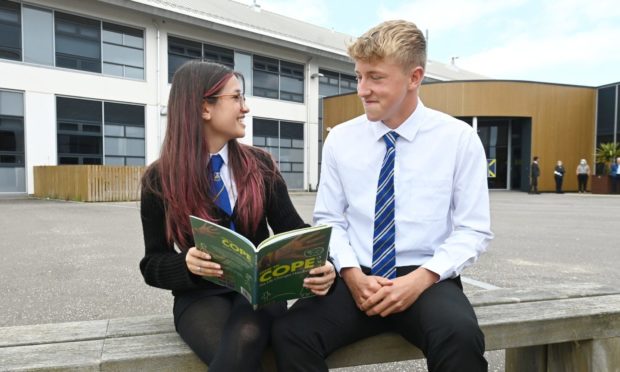Children and young people – and adults – struggling after lockdown are to be offered mental health support around the clock.
Two innovative new online services, Kooth (for those aged 10 to 18) and Togetherall (for those aged 16 and over), mean support will be available seven days a week, 365 days a year.
Launched yesterday at Mearns Academy in Laurencekirk, the apps are being rolled out across Aberdeenshire.
And young people will have a chance to chat with “peer mentors” their own age.
The initiative is the result of joint working between Aberdeenshire Council, Aberdeenshire Health and Social Care Partnership (AHSCP), Police Scotland, NHS Grampian, and voluntary partners.
It is being funded by a Scottish Government grant for the development of community mental health services for children and young people.
Kooth provides one-to-one sessions with counsellors, while Togetherall is a doctor-led app, with help from professional therapists, counsellors and social workers.
The specially-trained peer mentors will also be on hand to offer help and advice to those wishing to speak to someone their own age.
‘People try to hide that they’re struggling’
Two such mentors, Cameron Fryer, 15 and Corrine Turner, 16, both S5 pupils at Mearns Academy, said mental health was a crucial issue among today’s youth.
Cameron said: “Being a peer mentor involves helping younger people within the school who might be struggling, or would prefer to speak to someone their own age.
“It can be about relationships, making friends, school work, extra-curricular stuff, just anything really.
“I think the biggest thing has been coming out of lockdown.
“People hadn’t really communicated or seen any of their friends in a while.
“And when you did come out of lockdown you were maybe trying to hide the fact that you were struggling.
“I know a few people who were really struggling to communicate with people they’d known their whole life.”
Youth mental health a ‘massive issue’
And Corrine added: “When we were younger, we’d have wanted to talk to someone closer to our own age who has been through similar issues.
“That could be social media or cyberbullying, something which teachers or our parents haven’t been through.
“So it’s really good to get help and advice from someone who understands it and has gone through it.
“I think mental health is a massive issue among younger people, especially since Covid and coming out of lockdown.
“They might have lost touch with friends, or simply struggled being by themselves.”
Kooth and Togetherall were chosen using feedback from children and parents.
Both services offer children complete anonymity, which studies have shown is crucial in getting young people to come forward for help.
Mearns Academy head teacher Gareth Campbell said: “Mental health has been a concern over a number of years, and increasingly so during the pandemic.
“Young people have missed a long period of time in education.
“We’ve seen that they missed the social interaction – there has been social isolation.
“The exam system has also changed, which has added anxiety and stress.
“The apps and online sources that pupils have access to now will help them not only with their own mental health, but encourage their peers to use them.
“I think everyone’s mental health will have suffered during the pandemic, and I think young people are no different.
“They are our future, and the more we can do now, and the earlier we can help them to get on the right track, the better they’ll be going forward.”
Girls struggling, boys won’t talk
Aberdeenshire Council’s director of education, Laurence Findlay, said: “These services offer an alternative form of support for those who perhaps aren’t ready to speak in person yet, or simply wish to remain anonymous.
“We know, broadly speaking, that many women and girls are experiencing higher levels of anxiety and poorer mental wellbeing than was the case prior to the pandemic.
“Unfortunately, it’s still the case that many boys and men can find it hard to talk about how they are feeling.
“Sometimes this can make it more difficult for them to access support.
“These digital mental health services offer an alternative form of help which will appeal to many people.
“They will provide early support and reduce the risk of needing more intensive support later down the line.”
It is also a welcome move for community mental health practitioners who recognise the importance of early intervention.
Geraldine Fraser, partnership manager at AHSCP, said: “Around a quarter of us will suffer with mental ill health at some point in our lifetime, and talking about it can be difficult.
“Our new digital services are great resources which will help everyone who needs it.
“So, if you are concerned about your mental wellbeing, or have noticed that you are not feeling yourself and you need some support, then please use these services.”
More information is available at www.kooth.com and www.togetherall.com
